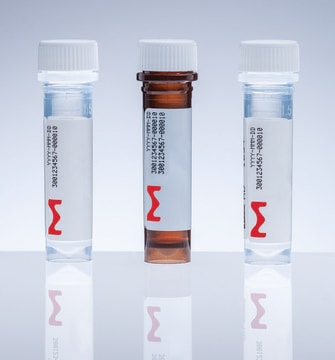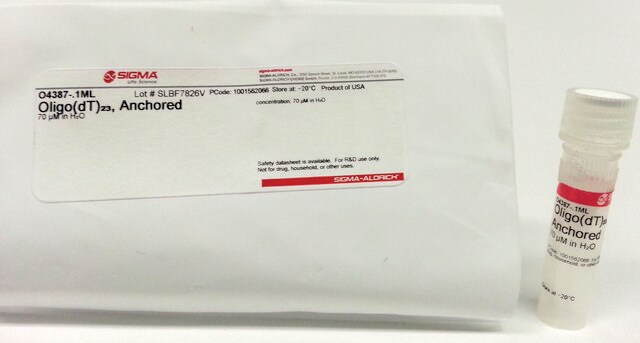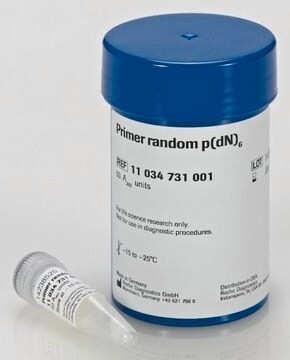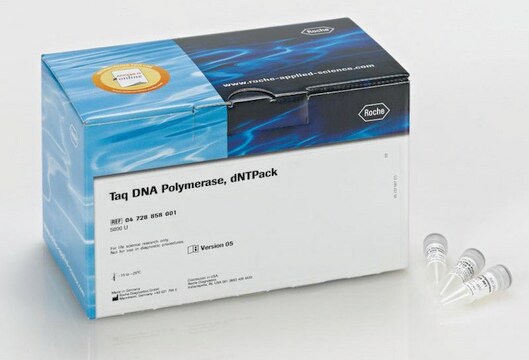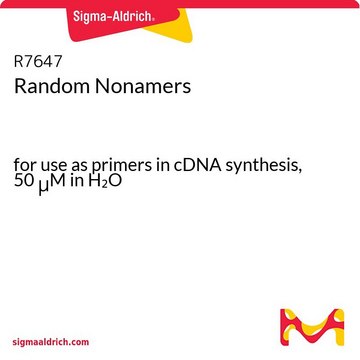10814270001
Roche
Primer for cDNA Synthesis
lyophilized, pkg of 40 μg
Synonym(s):
oligo-p(dt)15
Sign Into View Organizational & Contract Pricing
All Photos(1)
About This Item
UNSPSC Code:
41106300
Recommended Products
form
lyophilized
Quality Level
packaging
pkg of 40 μg
manufacturer/tradename
Roche
storage temp.
−20°C (−15°C to −25°C)
General description
This primer consists of a 15-mer oligonucleotide that shows thymidine (T) at each individual position. The oligonucleotides are HPLC purified, desalted, and supplied as a lyophilizate of the Li-salt. The p(dT)15 primer is not phosphorylated at the 5′ end.Oligo(dT)N generates full-length cDNAs. If template contains oligo(A) stretches internally, the primer may bind these, causing mis priming and transcripts that are not full-length.
Composition: p(dT)15[ 15-mer oligonucleotide containing only deoxythymidine (dT) residues].
Phosphorylation: The p(dT)15 primer is not phosphorylated at the 5′ end.
Composition: p(dT)15[ 15-mer oligonucleotide containing only deoxythymidine (dT) residues].
Phosphorylation: The p(dT)15 primer is not phosphorylated at the 5′ end.
Application
Primer for cDNA synthesis may be used in:
- RT-PCR
- Generation of cDNA libraries
- Synthesis of first-strand cDNA
Unit Definition
8 nmol ξ 1 A260 unit
Other Notes
For life science research only. Not for use in diagnostic procedures.
Storage Class Code
12 - Non Combustible Liquids
WGK
nwg
Flash Point(F)
does not flash
Flash Point(C)
does not flash
Choose from one of the most recent versions:
Already Own This Product?
Find documentation for the products that you have recently purchased in the Document Library.
Customers Also Viewed
Khalil Farhat et al.
Frontiers in immunology, 9, 2175-2175 (2018-10-20)
The precise impact of the somatotrope axis upon the immune system is still highly debated. We have previously shown that mice with generalized ablation of growth hormone (GH) releasing hormone (GHRH) gene (Ghrh-/-) have normal thymus and T-cell development, but
Agnes Bonnet et al.
BMC genomics, 12, 417-417 (2011-08-20)
Successful achievement of early folliculogenesis is crucial for female reproductive function. The process is finely regulated by cell-cell interactions and by the coordinated expression of genes in both the oocyte and in granulosa cells. Despite many studies, little is known
Bingshe Han et al.
PloS one, 7(5), e36941-e36941 (2012-06-01)
Our previous study shows that inhibiting activator protein one (AP1) transcription factor function in murine epidermis, using dominant-negative c-jun (TAM67), increases cell proliferation and delays differentiation. To understand the mechanism of action, we compare TAM67 impact in mouse epidermis and
Our team of scientists has experience in all areas of research including Life Science, Material Science, Chemical Synthesis, Chromatography, Analytical and many others.
Contact Technical Service
